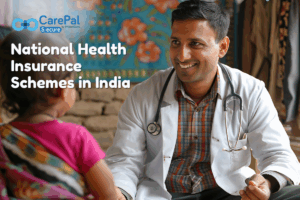How to Financially Plan for Critical
Illness Emergencies

How to Financially Plan for Critical Illness Emergencies?
While all illnesses are painful and expensive, to treat only a select few is critical. Critical illness refers to a life-threatening medical condition that typically requires extensive medical intervention. Critical illness include serious diseases, such as cancer, heart attack, stroke, kidney failure and major organ transplants. In contrast to common illnesses, which may require short-term treatment and recovery, critical illnesses require long-term medical intervention, specialized care, and significant financial resources. This is an important distinction, which is why critical illness insurance is a separate category of insurance in most of the developed countries in Europe and North America, but also in mid income countries like China and Malaysia. However, in India, even highly educated and aware customers are not clear about critical illness can wreck a family’s financial future. In this article, we will run you through basic steps you can take to make sure that you have a robust financial plan to meet the expenses of critical illness treatment.
What is the difference between Critical Illness and normal illness?
Differences in critical and common illness can mainly be seen in the long-term impact, complexity of treatment, as well as treatment cost.
- Long-term impact: Critical illness is defined as a severe medical condition that poses a significant threat to the individual’s life and, if left untreated or not effectively managed, can result in long-term disability or death. Common illnesses, (seasonal flu or mild infection), are usually mild, and carry a lower risk of severe complications.
- Complexity of Treatment: Treating critical illness conditions often requires complicated medical interventions, such as surgical procedures, chemotherapy, radiation therapy, and prolonged medication regimens. Such treatments need special medical personnel and institutions. On the other hand, common ailments typically can be treated more straightforward manner. Mind you, it’s not to suggest that normal illness is not dangerous, or the treatment is easy. For example, COVID was a very dangerous illness, but its treatment was straightforward. Hence, even with its worldwide devastation it is not classified as a critical illness.
- Treatment Costs: The financial burden of critical illness is often very high and often outstrip those of routine care. Critical illness treatment often requires prolonged and specialized treatments, state-of-the-art medical facilities, and advanced medical technology. Another important aspect of critical illness treatment is the added costs for rehabilitation, home care and lost wages while recovering. Since the recovery period is higher, these costs also become very important in planning for critical illness treatment.
Five steps to create a Plan for Critical Illness Financial Emergencies
The first step to protect your family from health emergency is to have good basic health insurance plan with adequate sum assured. If you don’t have one, you should stop reading further and immediately buy one. If you do have a good health insurance plan, here are additional steps you can take.
- Get a critical illness plan with adequate coverage: The first step is to get a good critical health insurance policy. Such a plan pays for costs incurred while in hospital, including room rent, doctor’s fees, diagnostic tests, and cost of medicines. It is a good idea to sign up for a critical health insurance plan sooner rather than later when premiums tend to be lower for young and healthy individuals. You can buy critical illness cover as part of rider with your base health insurance plan or you can buy it as standalone plan depending on the sum assured you want.
- Set Aside an Emergency Fund: Having an emergency fund is also important for dealing with sudden medical expenses. Try to save an amount that covers six months of your living expenses. This money can help you pay expenses like rent or groceries without high-cost loans or credit card debt. Having this money available as savings or in liquid mutual funds so it can be accessed quickly when required.
- Use Credit Cards Responsibly: During health crises, credit cards can provide short-term relief by distributing expenses over a brief timeframe. But, they should be used responsibility to not rack up-high interest debt. Select credit cards that charge little interest and have favorable terms. Certain credit cards also provide medical insurance benefits or facilitate the conversion of large medical expenses into affordable equated monthly installments (EMIs).
- Participate in a Health Ecosystem like Carepal secure: These health ecosystems are designed to lower medical costs. These networks typically negotiate lower rates on diagnostics, treatments and medications. Some employers also have wellness programs that can reward you with financial incentives, such as lower insurance premiums and reduced out-of-pocket costs for healthy habits.
- Regular Health Screenings and Preventive Care: Allocating funds to regular medical check-ups and preventive care measures can help detect potential health concerns early on, facilitating timely intervention that can minimise treatment-related expenses. Preventive services, including vaccinations and screenings, are typically covered under critical health insurance policies; so, leverage these within your benefits to stay well and decrease your risk of debilitating illnesses.
By following the five steps above, you will have built a sound financial plan to meet critical illness treatment costs. However, every plan should be reviewed periodically. Healthcare and insurance are ever-changing realms and therefore all the more reason for your critical illness treatment financial plan to be in line with current realities. So keep up to speed with new insurance recommendations, medical developments, and financial planning. Seek advice from financial advisors and insurance professionals to design a financial plan that will be best for your needs and situation.
Frequently Asked Questions
Good digestion ensures proper nutrient absorption, strengthens immunity, and boosts energy levels. It also prevents complications like weight gain, hormonal imbalances, and chronic diseases.
Consider the insurer’s financial stability, claims process, coverage terms, and inclusion of services like teleconsultation and diagnostic tests. These factors ensure smooth access to care and timely claim settlements.
Poor digestion can cause nutrient deficiencies, weakening the immune system and leading to fatigue. It’s also linked to weight gain, diabetes, and mental health issues.
Adopt a balanced diet rich in fiber and fermented foods, quit smoking, avoid alcohol, exercise regularly, and manage stress to support healthy digestion.
It offers comprehensive benefits, including hospitalization, diagnostic tests, and teleconsultation, with a reduced waiting period for pre-existing conditions and cashless treatments.
Hi, my name is Om, and I am a developer at Carepal Secure. With a strong passion for technology and innovation, I enjoy creating effective solutions and learning new skills to enhance my expertise. My journey in development has been both challenging and rewarding, allowing me to grow professionally while contributing meaningfully to the projects I work on.












